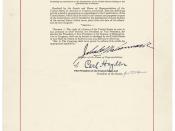In order for an officer of the law to legally search your private dwelling, they must have a search warrant. In order for them to obtain that search warrant, they must have probable cause and the warrant must state the specific place and time for the location to be searched. All of this is covered in the Fourth Amendment of the United States Constitution. If police officers without search warrants inspect curbside garbage for evidence are they violating our Fourth Amendment rights? I feel the police should have the right to search garbage left upon a public street. It is not an unreasonable search when they take garbage to look for evidence. People throw garbage on the ground all the time. They don't feel they have had their privacy violated when someone picks it up and throws it away. After all garbage is just a bag of things the owner doesn't want, and must not care what happens to it if they leave it in a public area.
In American colonial times is when the Fourth Amendments base was believed to have been founded. The amendment likely came about because the British king would take out general warrants that did not specify time or scope, and lacked a list of specific persons whom were to be searched. These warrants were issued without probable cause often to apprehend critics of the government (Clark 540). The Fourth Amendment now protects against unreasonable searches and seizures, unless a proper warrant is obtained. The Supreme Court feels differently when it comes to garbage.
The Supreme Court has now said that your trash is no longer actually yours. The court stated, "It is common knowledge that plastic garbage bags left on or at the side of a public street are readily accessible to animals,
![[New York Bank Note Co. notice] (LOC)](https://s.writework.com/uploads/17/171683/new-york-bank-note-co-notice-loc-thumb.jpg)

